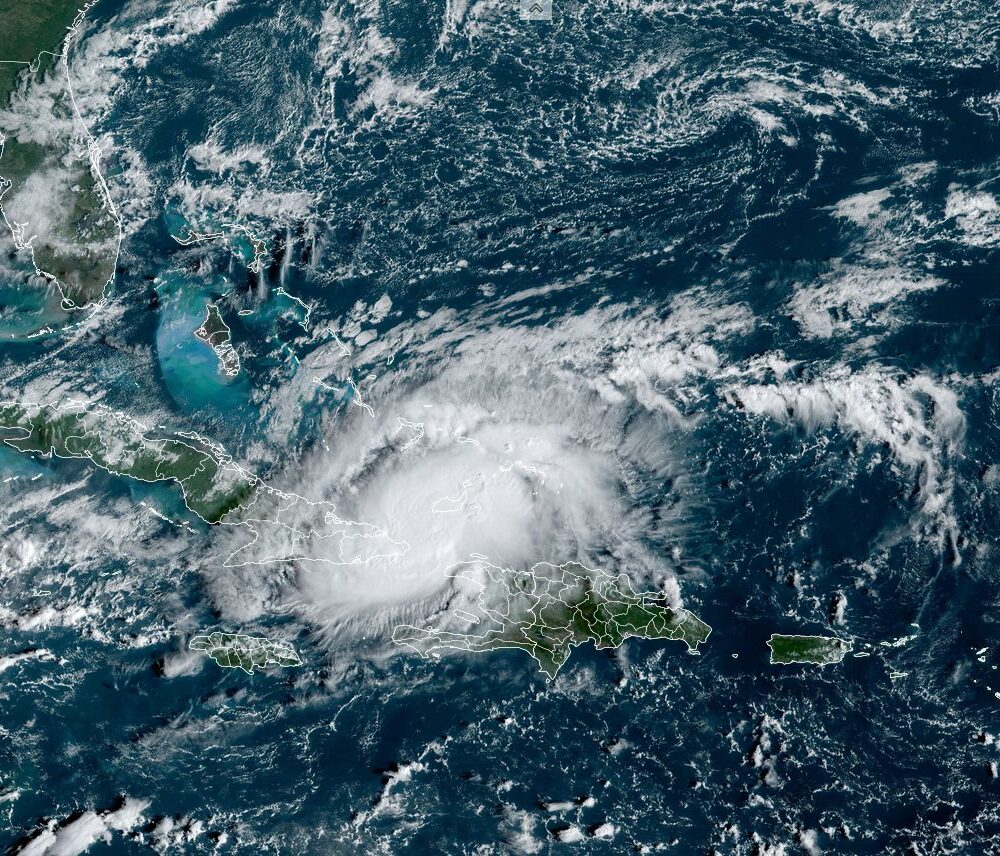As of Saturday evening, hurricane-force winds extended just 5 miles from the center.

Hurricane Oscar as it appeared on satellite on Sunday morning.
Credit: NOAA
A hurricane so small that it could not be observed by satellite formed this weekend, surprising meteorologists and even forecasters at the National Hurricane Center.
Hurricane Oscar developed on Saturday near Turks and Caicos, and to the northeast of Cuba, in the extreme southwestern Atlantic Ocean. As of Saturday evening, hurricane-force winds extended just 5 miles (8 km) from the center of the storm.
This is not the smallest tropical cyclone—as defined by sustained winds greater than 39 mph, or 63 kph—as that record remains held by Tropical Storm Marco back in 2008. However, this may possibly be the smallest hurricane in terms of the extent of its hurricane-force winds.
Not detected by satellite
Oscar was so small that its winds could not be detected by Earth-observation satellites that estimate wind speeds in tropical cyclones.
Writing in his summary of Oscar's development on Saturday afternoon, National Hurricane Center forecaster Philippe Papin noted that the hurricane was only discovered due to a last-minute flight by Air Force Hurricane Hunter aircraft.
"It is fair to say its been an unexpected day with regards to Oscar," he wrote in his 5 pm ET advisory. "After being upgraded to a tropical storm this morning, a resources-permitting Air Force Reconnaissance mission found that Oscar was much stronger than anticipated and in fact was a tiny hurricane. It is worth noting that remote sensing satellite intensity estimates are currently much lower."
Satellites do not have the capability to directly measure wind speeds, so they make estimates based upon other observable variables, using instruments such as a scatterometer. Yes, that's a real word. By these indirect estimates, Oscar had sustained winds between 48 mph and 63 mph (77 kph to 101 kph), which remains well below the threshold for a hurricane (74 mph, 119 kph).
The Air Force aircraft found sustained winds, in a tiny area to be sure, of 85 mph (137 kph). Hence, Hurricane Oscar.
How this happened
Oscar's development shocked forecasters. There was only a modest indication from satellite imagery, as of Friday, that anything would form; and none of the major global models indicated development of any kind. It was thought that the area of low pressure would get swamped by vertical wind shear this weekend as it neared Cuba.
However, the tiny size of Oscar confounded those expectations. Weather models struggle with the development of small hurricanes, and this is largely because the micro-physics of the smallest storms occur below the resolution of these models. Additionally, tiny hurricanes organize much more quickly and efficiently.
In other words, small storms can more easily make quick changes. Which is what happened with Oscar. The storm will bring heavy rain and winds to the eastern half of Cuba on Sunday before it lifts to the northeast, and brings rainfall and some storm surge into the Bahamas early next week.
RIP Matrix | Farewell my friend ![]()
Hope you enjoyed this news post.
Thank you for appreciating my time and effort posting news every day for many years.
2023: Over 5,800 news posts | 2024 (till end of September): 4,292 news posts


3175x175(CURRENT).thumb.jpg.b05acc060982b36f5891ba728e6d953c.jpg)
Recommended Comments
Join the conversation
You can post now and register later. If you have an account, sign in now to post with your account.
Note: Your post will require moderator approval before it will be visible.